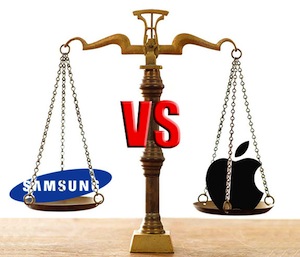CNet Asia’s Spencer Pangborn has produced an insightful article discussing the legal battles, and where he thinks they’re likely headed in the future.
 (Image credit: AllVoices)
(Image credit: AllVoices)
Pangborn states, and I largely agree, that these “patent wars” can easily be considered as the biggest tech news of 2011, as the outcome of these legal battles could forever shape the way disputes are decided over patents and intellectual rights.
The article also rightly points out that Samsung and Apple aren’t the two major forces at play here. Instead, considering that Google recently purchased Motorola Mobility, Google is a significant stakeholder in these battles as well, as their intentions behind the $12.5 billion purchase Motorola mobility are unclear (although there’s good reason to think that Motorola’s patents were a primary motivation).
These Disputes Are Nothing More Than Childish Antics
Pangborn draws an analogy summing up these legal disputes that I appreciate very much:
The best analogy I can think of is eating dinner in a prison cafeteria. Apple, Samsung, and Google are all sitting at the table hunched over the most delicious meal of the week: Country fried steak, gravy, and mashed potatoes.
The meal started off civil, but then Samsung noticed that Apple had an extra helping of mashed potatoes. When Apple was looking the other way, Samsung reached and snagged a cheeky spoonful. Apple turned back, noticed that something was missing but just let it slide.
Later, with new found confidence, Samsung went for a big piece of country fried steak, but that’s a no-no. Apple slapped away Samsung’s hand and although it didn’t leave a mark, it certainly did sting.
The article continues to suggest that the legal battles of 2011 are just heating up, with these companies spending vast resources on their legal battles rather than investing that money in the advancement of their technology. Pangborn concludes by suggesting that there will be no easy end – it’s unlikely that one company will ever come out as the clear winner. Instead, the battle will be a continuous one with each company bruising the others, but causing no lasting damage.
Why The Consumers Are The Real Losers
In considering the points made in Pangborn’s article, seems very clear to me that, despite your feelings about who is or is not in the wrong in these matters (although I feel that there are some very compelling reasons to believe that Samsung is blatantly copying Apple), the real loser in these legal proceeding is the consumer.
By focusing an enormous amount of time and effort on attacking their competitors, rather than on continuing to innovate and moving technology forward, Samsung (and possibly Google) are damaging the consumer electronics industry, driving prices up for consumers, and crippling the true competitive process that causes technology to improve.
Speaking to all companies, resorting to patent disputes (and the purchasing of patents to fuel further disputes), many of which revolve around ideas that are so basic that they likely shouldn’t have been granted at all, as a way to cripple your competitors is not only ultimately doomed to failure (as we are seeing in the Samsung vs Apple cases), it’s anti-competitive in its vary nature, and cripples innovation.
Final Thoughts
Instead of mimicking each other’s designs, or pointlessly smacking each other around like school children, often with weak cases that revolve around patents for very basic and obvious ideas, would it not be in each company’s best interest (and indeed the interest of every consumer) to simply compete by innovating, creating new ideas, developing new technologies and moving the world forward?
The whole matter is pretty disconcerting, and I suppose it’s a bit naive for me to expect those running these companies to behave like adults rather than like children on a playground arguing over who’s bike is cooler, or like prison inmates eating lunch who can’t be satisfied with what is on their own tray, and must take away from the others.
Still, however, I just can’t help but think that if modern companies would just lower their weapons, and use their resources to do what made them great in the first place – inventing, innovating, and pushing the world forward with new ideas – each company (and the world) would be much better off as a result.


